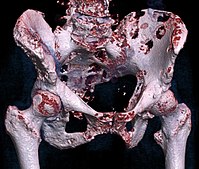
Photo from wikipedia
Abstract Postoperative delirium (PD), characterized by acute onset of global impairment in consciousness and cognition, is a common complication following major surgeries and is often associated with adverse outcomes. Because… Click to show full abstract
Abstract Postoperative delirium (PD), characterized by acute onset of global impairment in consciousness and cognition, is a common complication following major surgeries and is often associated with adverse outcomes. Because of the multiple comorbidities of the patient along with extensive nature of the surgery, patients undergoing surgery for bone metastases may be prone to developing PD. However, no study exists regarding PD in patients who undergo surgery for bone metastases. Two hundred seventy six patients with mean age of 64 years (range, 16–94) who underwent surgery for bone metastases were reviewed. The diagnosis of PD was made by the psychiatrist, according to fourth edition of the Diagnostic and Statistical Manual of Mental Disorders. Possible perioperative clinic-pathologic factors that may be associated with the development of PD were investigated. Among the 276 patients, 9% (n = 25) developed PD. On multivariate logistic regression analysis, history of psychiatric disorders (odds ratio [OR] = 9.63; 95% confidence interval [CI] 1.78–21.74, P = .004), high preoperative serum C-reactive protein (CRP) level (OR = 1.17; 95% CI 1.06–1.29, P = .001), low preoperative serum albumin level (OR = 0.13; 95% CI 0.03–0.48, P = 0.002), and high dose of opioid analgesics received in the immediate postoperative period (OR = 1.05; 95% CI 1.01–1.07, P = .001) were independently associated with the development of PD. Patients with PD had lower survival (log rank, P = .001) than patients without PD. Incidence of PD is considerable in patients undergoing surgery for bone metastases. History of psychiatric disorders, preoperative serum albumin and CRP levels, and the dose of postoperative opioid analgesics are associated with the development of PD.
Journal Title: Medicine
Year Published: 2020
Link to full text (if available)
Share on Social Media: Sign Up to like & get
recommendations!